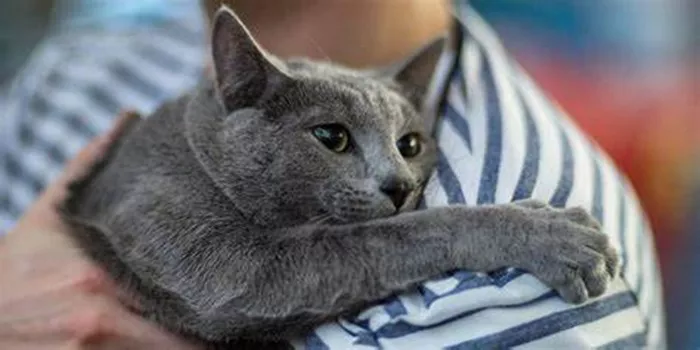Korat cats are known for their striking silver-blue coats, large emerald eyes, and affectionate personalities. These intelligent and loyal felines form strong bonds with their owners, often seeking attention and companionship. However, the question remains: are Korat cats clingy? In this comprehensive guide, we’ll explore the characteristics of Korat cats, their social needs, and how to manage any potential clinginess.
The Korat Cat
Korats are a breed of cat that originated in Thailand, with a history dating back to the 14th century. These medium-sized cats are known for their muscular build, heart-shaped heads, and distinctive silver-tipped blue coats that almost seem to glow. Their large, expressive eyes are a striking emerald green, radiating curiosity and intelligence.
Korats are generally healthy cats with a relatively long lifespan, often remaining active and playful well into their senior years. This endearing quality has made them popular companions for many cat lovers.
Personality and Temperament
Korat cats are known for their affectionate and social nature. They form strong bonds with their owners and often seek attention and companionship. Korats are very intelligent and enjoy being involved in the daily activities of their household members.
These cats are generally gentle and get along well with children and other pets when properly introduced. Their playful and curious nature makes them excellent companions for families, singles, and couples alike.
Korats are adaptable to various living situations, whether they are alone at home or in a busy household. They are generally quiet cats, using soft sounds to communicate. This makes them suitable for both apartments and houses.
Understanding Their Social Needs
Korat cats are social creatures and thrive on interaction with their owners. They often follow their humans around the house, seeking attention and affection. This behavior can be perceived as clinginess by some owners, but it is important to understand that it is a natural part of their social needs.
Korats do not do well when left alone for extended periods. They may develop separation anxiety or engage in destructive behaviors if they feel isolated from their owners. It is crucial to provide Korats with plenty of interaction, playtime, and mental stimulation to keep them happy and healthy.
See Also: Are Korat Cats Good with Other Animals?
Managing Clinginess in Korat Cats
While Korat cats are affectionate by nature, there are ways to manage any potential clinginess and ensure a healthy relationship between the cat and its owner.
Establish a Routine
Korats thrive on routine and feel more secure when they know what to expect. Establish a daily schedule for feeding, playtime, and affection to help your cat feel more at ease when you are not actively interacting with them.
Provide Enrichment
Korats are intelligent cats that need mental stimulation to prevent boredom and destructive behaviors. Provide your cat with plenty of toys, scratching posts, and cat trees to encourage their natural instincts to climb, scratch, and play. Rotate toys regularly to keep your cat engaged and interested.
Encourage Independent Play
Set aside time each day for your Korat to engage in independent play. This helps them develop confidence and self-reliance, reducing their dependence on constant human interaction. Provide interactive toys that they can play with on their own, such as puzzle feeders or treat-dispensing toys.
Gradually Increase Alone Time
If your Korat is particularly clingy, gradually increase the amount of time they spend alone. Start with short periods of separation and gradually extend the duration over time. This helps your cat learn to cope with being alone without experiencing distress.
Consider a Companion
In some cases, providing your Korat with a feline companion can help reduce clinginess and provide additional social interaction. However, it is important to introduce any new cats slowly and under supervision to ensure a smooth transition.
Grooming and Care
Korat cats have a short, dense coat that requires minimal grooming. Weekly brushing helps remove loose hair and keeps their coat looking shiny and healthy. Regular nail trims and ear cleaning are also important for their overall well-being.
While Korats are generally healthy cats, they can be susceptible to certain genetic disorders. Regular veterinary check-ups, vaccinations, and dental care are essential for maintaining their health and preventing serious issues.
Conclusion
Korat cats are affectionate and social felines that form strong bonds with their owners. While their clinginess may be endearing to some, it is important to understand and manage their social needs to ensure a happy and healthy relationship. By providing your Korat with plenty of interaction, enrichment, and alone time, you can help them develop confidence and independence while still enjoying the benefits of a close bond with their human companion.
Related Topics
























